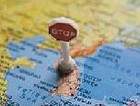| View previous topic :: View next topic |
| Author |
Message |
Bronski

Joined: 17 Apr 2006
|
 Posted: Thu Jul 23, 2009 9:28 pm Post subject: Konglish Posted: Thu Jul 23, 2009 9:28 pm Post subject: Konglish |
 |
|
Let's discuss Konglish using wikipedia's definition as "the use of English words (or words derived from English words) in a Korean context."
There was a short discussion about this in the Job forum, but that was more about planning an activity on Konglish/English in the classroom. That thread is here: http://forums.eslcafe.com/korea/viewtopic.php?t=161516
I'm interested in compiling a sort of Konglish lexicon in this thread.
kneezah~ contributed the following in the other thread.
| Quote: |
skinship -> the best translation i can come up for this one is "touching" or "physical contact"
glamorous -> curvy body (more specifically a large chested)
perriot -> clown (techically this is correct, but comes from french, not english)
officetel-> an apartment on top of a store (i have no idea what this is called in english)
one room -> studio apartment / bachelor
hacking -> cheating on a test
fighting -> i'm not too sure how this would be translated... victory?
one piece -> dress
manicure -> nail polish. when manicure is used in korean i think it just generally refers to nail polish (not the actual service)
meeting -> blind date |
This guy has collected quite a few: http://efl.htmlplanet.com/konglish.htm
I'd also add band-->band-aid
Anything else Konglish related (funny anecdotes, etc) is up for discussion as well, of course.
Also, just wondering, did any of you say air-con in your home countries before you came here? It seems like a natural thing to say, but I can't remember. The guy in the thread I posted says it comes orginally from Japanese-English (Jinglish).
화이팅! |
|
| Back to top |
|
 |
redaxe
Joined: 01 Dec 2008
|
 Posted: Thu Jul 23, 2009 9:57 pm Post subject: Posted: Thu Jul 23, 2009 9:57 pm Post subject: |
 |
|
"Fighting" -> good luck (gerund used in place of imperative)
"Service" -> (adj.) meaning free or included in the price of your meal
"hand phone" -> cell phone (not unique to Korea though)
"officetel" -> office + hotel (Koreans run small businesses out of them)
"free talking" -> conversation for the purpose of practicing language skills
"one shot" -> (v.) to chug |
|
| Back to top |
|
 |
typo
Joined: 16 Jun 2009
|
|
| Back to top |
|
 |
scorpiocandy
Joined: 27 Feb 2008
|
 Posted: Thu Jul 23, 2009 10:19 pm Post subject: Posted: Thu Jul 23, 2009 10:19 pm Post subject: |
 |
|
Apparently "small-minded" means someone who is shy and timid.
I had students calling each other small-minded and was wondering why there weren't more fights breaking out over this |
|
| Back to top |
|
 |
joshua7choi

Joined: 05 Jun 2008
Location: Suwon
|
 Posted: Fri Jul 24, 2009 12:22 am Post subject: Posted: Fri Jul 24, 2009 12:22 am Post subject: |
 |
|
GOOD POINTS. I myself as a Korean often use broken english words unconciously for I learned them from media,books and schools in Korea.
Korean language is actually mixed with many foreign language such as Japanese, chinese and english. For example, bendo(lunch box), yibbai(full), warabasi(chopstick), etc from Japan. (especially during the invansion) Also chinese characters has been used in many korean text books including even Korean laws.
I'm trying to get all your detailed correction for better communication.
(For 'Bye Bye', ooops I often use it for adults... sorry for that.-_-
I'm curious 'how about english?' As far as I know about english words all english speaking countries use english in a bit different ways. Please share with your own ideas. ^^ |
|
| Back to top |
|
 |
Bronski

Joined: 17 Apr 2006
|
 Posted: Fri Jul 24, 2009 1:37 am Post subject: Posted: Fri Jul 24, 2009 1:37 am Post subject: |
 |
|
joshua7choi, your question about varieties of English is something I'm interested in as well, though it's a rather enormous topic in its own right. It's interesting to hear about the influence of other languanges on Korean. The word arbeit 알바이트 (not sure about German or Korean spelling) comes from German, too.
Everybody else, thanks for the links and contributions. |
|
| Back to top |
|
 |
crossmr

Joined: 22 Nov 2008
Location: Hwayangdong, Seoul
|
 Posted: Fri Jul 24, 2009 3:39 am Post subject: Posted: Fri Jul 24, 2009 3:39 am Post subject: |
 |
|
Fighting - I see this more of a "You can do it!" or "we can do it!"
a little different than good luck. |
|
| Back to top |
|
 |
Ausesl
Joined: 27 Jan 2008
|
 Posted: Fri Jul 24, 2009 5:02 am Post subject: Posted: Fri Jul 24, 2009 5:02 am Post subject: |
 |
|
| Bronski wrote: |
joshua7choi, your question about varieties of English is something I'm interested in as well, though it's a rather enormous topic in its own right. It's interesting to hear about the influence of other languanges on Korean. The word arbeit 알바이트 (not sure about German or Korean spelling) comes from German, too.
Everybody else, thanks for the links and contributions. |
The word arbeit is used in both German and Dutch. The Japanese also use it. The spelling you used isn't correct but since I don't have the language support on this computer, I can't show you by typing it. It is 5 blocks not four. The first one is 알 without the lyul. That goes in the next block.
I personally think that Konglish is retarded. All it does is create the perception that it is real English and farks Koreans up. Here are the ones that I teach in class:
Konglish
Most words in �konglish� have a meaning different to the word in English and it is important for people that are studying English as a Second Language to understand the difference. Below is a list of Konglish mistakes.
This is a Korean traditional food. (This is traditional Korean food)
Almost Koreans like Kimchi. (Almost all/most Koreans like Kimchi)
Speaker 1 �Let�s meet on Saturday at 1 o�clock�. Speaker 2 �Ok, I expect� (I can�t wait!)
Last night I was very drunken. (Last night I was very drunk)
I am working at my part time job now. (I am working now)
This is a service. (This is for free)
I live in a mansion. (I live in an apartment)
Do you have a fire? (Do you have a lighter?)
Are you funny? / I am funny. (Are you having fun? / I am having fun)
Please understand my mind. (Please understand me)
I have five families. My family is five. (There are five people in my family)
Who are you talking? (Can I ask who is calling?)
I will do it as possible as I can. (I will do my best / what I can)
We are very intimate friends. (We are close/good friends)
I use these in my classes and it is real popular. I don't have my updated list at the moment. It is on my work computer. This should help you in your classes. |
|
| Back to top |
|
 |
Emeliu
Joined: 31 Mar 2009
Location: Korea, i'm OMW
|
 Posted: Fri Jul 24, 2009 5:50 am Post subject: Posted: Fri Jul 24, 2009 5:50 am Post subject: |
 |
|
| Ausesl wrote: |
| Are you funny? / I am funny. (Are you having fun? / I am having fun) |
Omg, this one is the worst! No matter how much I teach Koreans not to say "Omg thats so funny!" after riding on a roller coaster, they just keep on saying it. |
|
| Back to top |
|
 |
Ruthdes

Joined: 16 Oct 2008
Location: Seoul
|
 Posted: Fri Jul 24, 2009 9:36 am Post subject: Re: Konglish Posted: Fri Jul 24, 2009 9:36 am Post subject: Re: Konglish |
 |
|
| Bronski wrote: |
Also, just wondering, did any of you say air-con in your home countries before you came here? It seems like a natural thing to say, but I can't remember. The guy in the thread I posted says it comes orginally from Japanese-English (Jinglish).
화이팅! |
In Oz we apparently abbreviate all the time. As such, "air con" is common. When I got here, I was surprised to find that we seem to be alone in this habit. I'm not sure if Kiwis share it or not. I have often caused confusion among my American friends by telling them that we'll do something "this arvo" rather than "this afternoon".
With respect to the point of the OP, I teach adults and hear Konglish all the time. The most common are:
On the phone: "I am XXXX"
"How about Korea?"
"Do you have a time?"
"Kimchi is good for health"
And then the expressions that they are taught in middle school that are technically correct, but in become cliched in their overuse.
"In the case of ...."
"Nothing special"
"At that time.."
"As you know..."
etc |
|
| Back to top |
|
 |
peppermint

Joined: 13 May 2003
Location: traversing the minefields of caddishness.
|
 Posted: Fri Jul 24, 2009 10:36 am Post subject: Posted: Fri Jul 24, 2009 10:36 am Post subject: |
 |
|
| joshua7choi wrote: |
I'm curious 'how about english?' As far as I know about english words all english speaking countries use english in a bit different ways. Please share with your own ideas. ^^ |
I'm a Canadian, and I used to work with several Americans and a couple of Brits. In the staff room one day, one of the Brits asked for a rubber, and the Americans raised their eyebrows. (the Brit was asking someone to pass him an eraser, but apparently in the US, a "rubber" is a condom. In my part of Canada, I've heard rubber for either eraser or condom, but it was clear that he wanted an eraser from the context)
Last edited by peppermint on Fri Jul 24, 2009 10:38 am; edited 1 time in total |
|
| Back to top |
|
 |
maryjanes
Joined: 22 Jul 2009
Location: Cheongju
|
 Posted: Fri Jul 24, 2009 10:38 am Post subject: Posted: Fri Jul 24, 2009 10:38 am Post subject: |
 |
|
| Hee hee! This is really helpful as I've been advised to brush up on my Konglish to help me to communicate with a reluctant co-teacher. Thanks for all the tips!! |
|
| Back to top |
|
 |
nfld_chingu
Joined: 29 Jun 2009
|
 Posted: Fri Jul 24, 2009 10:43 am Post subject: Posted: Fri Jul 24, 2009 10:43 am Post subject: |
 |
|
I used to have a Korean friend who would say "You look so boring" if I looked bored ... assuming that they meant "You look bored"  |
|
| Back to top |
|
 |
Ruthdes

Joined: 16 Oct 2008
Location: Seoul
|
 Posted: Fri Jul 24, 2009 2:51 pm Post subject: Posted: Fri Jul 24, 2009 2:51 pm Post subject: |
 |
|
| ^^^^ Hahaha...I love that one. It's funniest when they are talking about themselves though. Yes, I agree. You are quite boring! |
|
| Back to top |
|
 |
Snake Doctor
Joined: 14 Jul 2009
|
 Posted: Fri Jul 24, 2009 3:36 pm Post subject: Posted: Fri Jul 24, 2009 3:36 pm Post subject: |
 |
|
| Bangkok bang means room, kok I guess means stay. Stay home |
|
| Back to top |
|
 |
|

